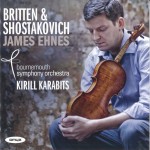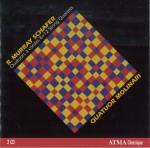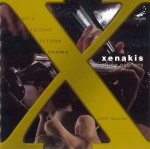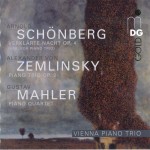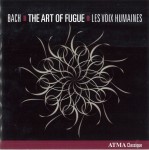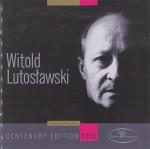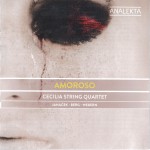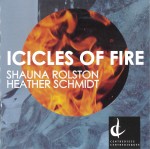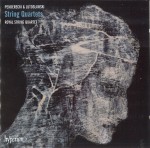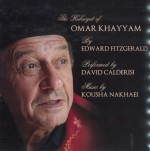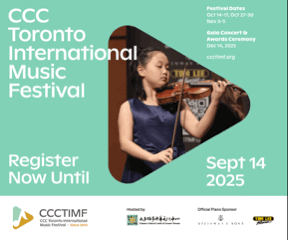Editor's Corner - September 2013
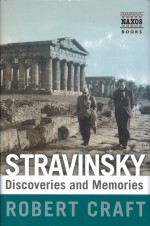 The extra month off since the publication of our extended summer issue has made it even harder than usual to return to the task at hand. Where to begin after three months of eclectic listening? One ongoing project over the summer involved more reading than listening, although it certainly sent me back to my collection to revisit some of the great works of the 20th century. Stravinsky – Discoveries and Memories is kind of a tell-all book by Stravinsky’s amanuensis Robert Craft (Naxos Books ISBN 978-1-84379-753-1). Craft worked intimately with Stravinsky over most of the last 25 years of the composer’s life and we are treated to a “fly on the wall” view not only of his creative but also his social activities. The book is divided into three sections: The Music; The Man; Friends and Acquaintances. It is the first of these that I found most interesting, primarily the debunking of the myth of animosity between the “rivals” Stravinsky and Schoenberg. The second and third sections with their focus on more prurient themes was less satisfying although there are fascinating moments involving Stravinsky and some of the notable giants of the past century. This includes not just the usual suspects — musicians and artists Prokofiev, Diaghilev, Picasso, Dali, Gershwin, Copland, Carter, Sessions and Berio — but also literary and scientific figures like T.S. Eliot, Thomas Mann, Aldous Huxley, Kenneth Clark and Edwin Hubble, plus a few seemingly unlikely figures such as Mussolini and Warren Zevon. It’s like a Who’s Who of the 20th century, but of course Stravinsky himself would be at the top of that list. The book includes a CD with an outstanding performance of The Rite of Spring with Craft conducting the Philharmonia Orchestra in 2007 using the composer’s corrected 1967 edition based on the 1913 original.
The extra month off since the publication of our extended summer issue has made it even harder than usual to return to the task at hand. Where to begin after three months of eclectic listening? One ongoing project over the summer involved more reading than listening, although it certainly sent me back to my collection to revisit some of the great works of the 20th century. Stravinsky – Discoveries and Memories is kind of a tell-all book by Stravinsky’s amanuensis Robert Craft (Naxos Books ISBN 978-1-84379-753-1). Craft worked intimately with Stravinsky over most of the last 25 years of the composer’s life and we are treated to a “fly on the wall” view not only of his creative but also his social activities. The book is divided into three sections: The Music; The Man; Friends and Acquaintances. It is the first of these that I found most interesting, primarily the debunking of the myth of animosity between the “rivals” Stravinsky and Schoenberg. The second and third sections with their focus on more prurient themes was less satisfying although there are fascinating moments involving Stravinsky and some of the notable giants of the past century. This includes not just the usual suspects — musicians and artists Prokofiev, Diaghilev, Picasso, Dali, Gershwin, Copland, Carter, Sessions and Berio — but also literary and scientific figures like T.S. Eliot, Thomas Mann, Aldous Huxley, Kenneth Clark and Edwin Hubble, plus a few seemingly unlikely figures such as Mussolini and Warren Zevon. It’s like a Who’s Who of the 20th century, but of course Stravinsky himself would be at the top of that list. The book includes a CD with an outstanding performance of The Rite of Spring with Craft conducting the Philharmonia Orchestra in 2007 using the composer’s corrected 1967 edition based on the 1913 original.
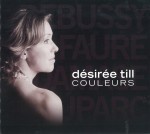 One of the most recent discs to cross my desk came from a local cellist I have long admired, Coenraad Bloemendal, who produced it. Couleurs (Erdeco recordings triodesiree.ca) is a collection of French art songs by Duparc, Fauré, Debussy and Damase featuring Swiss-born Dutch soprano Désirée Till and one of Canada’s national treasures, harpist Erica Goodman. The Fauré and Debussy transcriptions are by Goodman with Charles Heller handling the Duparc. Till’s credits stem mostly from the world of operetta on the European stage but she achieved her masters in Music Interpretation at the Université de Montréal in 2009 and the following year founded Trio Désirée with Goodman and Bloemendal. Although at times I find her voice a bit too “big” for the intimacy of this repertoire, she works well with Goodman in the bulk of the selections, consisting of harp transcriptions of piano accompaniments. Most effective for me are the tracks that include Bloemendal’s expressive cello lines which greatly add to the contrast on a disc which at other times suffers from a certain sameness of texture.
One of the most recent discs to cross my desk came from a local cellist I have long admired, Coenraad Bloemendal, who produced it. Couleurs (Erdeco recordings triodesiree.ca) is a collection of French art songs by Duparc, Fauré, Debussy and Damase featuring Swiss-born Dutch soprano Désirée Till and one of Canada’s national treasures, harpist Erica Goodman. The Fauré and Debussy transcriptions are by Goodman with Charles Heller handling the Duparc. Till’s credits stem mostly from the world of operetta on the European stage but she achieved her masters in Music Interpretation at the Université de Montréal in 2009 and the following year founded Trio Désirée with Goodman and Bloemendal. Although at times I find her voice a bit too “big” for the intimacy of this repertoire, she works well with Goodman in the bulk of the selections, consisting of harp transcriptions of piano accompaniments. Most effective for me are the tracks that include Bloemendal’s expressive cello lines which greatly add to the contrast on a disc which at other times suffers from a certain sameness of texture.
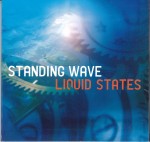 Although one might think that any disc entirely devoted to one combination of instruments (or voices) might be susceptible to the same criticism, certainly this is not the case in Liquid States recently released by the Vancouver ensemble Standing Wave (Redshift Music TK427 redshiftmusic.org). The group’s instrumentation is fairly unusual — clarinet(s), violin, cello, piano and percussion — but even this somewhat limited palette is used with great diversity by the four composers represented here. Jeffrey Ryan’s Burn is perhaps the most traditional with its lyrical melodic lines and moods that shift between sombre stasis and whirling rising motifs. Jocelyn Morlock’s Theft I: Water Clocks and Theft II: Insomnia opens extremely quietly with soft arpeggiated piano, droning clarinet and a very high violin melody. The textures thicken as the movement develops and cello and vibraphone are added to the mix before returning to near inaudibility. The second movement is a stark contrast beginning with an abrupt drum roll and a busy piano line over which violin and clarinet interpolate bird-like calls and twitters. It’s no wonder there’s no sleep here. Rodney Sharman’s Pavane, Galliard, Variations is another soundworld altogether with its reinvention of keyboard works by English renaissance composer William Byrd. The strings and clarinet are played in a manner suggestive of a consort of viols, with the piano notes damped and the percussion utilizing eerily pitched gongs. These very effective pieces transport us back to an imagined time half a millennium ago. In stark contrast Linda Bouchard’s Liquid States with its strummed violin chords and plucked cello notes combining with low piano ostinatos, high-hat paradiddles and whining clarinet lines carries relentlessly forward on a 15- minute voyage that culminates in metallophone cacophony before gradually subsiding. An exciting journey indeed.
Although one might think that any disc entirely devoted to one combination of instruments (or voices) might be susceptible to the same criticism, certainly this is not the case in Liquid States recently released by the Vancouver ensemble Standing Wave (Redshift Music TK427 redshiftmusic.org). The group’s instrumentation is fairly unusual — clarinet(s), violin, cello, piano and percussion — but even this somewhat limited palette is used with great diversity by the four composers represented here. Jeffrey Ryan’s Burn is perhaps the most traditional with its lyrical melodic lines and moods that shift between sombre stasis and whirling rising motifs. Jocelyn Morlock’s Theft I: Water Clocks and Theft II: Insomnia opens extremely quietly with soft arpeggiated piano, droning clarinet and a very high violin melody. The textures thicken as the movement develops and cello and vibraphone are added to the mix before returning to near inaudibility. The second movement is a stark contrast beginning with an abrupt drum roll and a busy piano line over which violin and clarinet interpolate bird-like calls and twitters. It’s no wonder there’s no sleep here. Rodney Sharman’s Pavane, Galliard, Variations is another soundworld altogether with its reinvention of keyboard works by English renaissance composer William Byrd. The strings and clarinet are played in a manner suggestive of a consort of viols, with the piano notes damped and the percussion utilizing eerily pitched gongs. These very effective pieces transport us back to an imagined time half a millennium ago. In stark contrast Linda Bouchard’s Liquid States with its strummed violin chords and plucked cello notes combining with low piano ostinatos, high-hat paradiddles and whining clarinet lines carries relentlessly forward on a 15- minute voyage that culminates in metallophone cacophony before gradually subsiding. An exciting journey indeed.
The final two CDs have a number of things in common: local composer-performers creating unique hybrids of classical and jazz, with some pop and world music influences, fine musicianship and excellent production values. It does not come as a surprise that with regard to this latter aspect the bulk of the recording was done at Toronto’s Canterbury Music facility, known for a long history of attention to detail and use of the most appropriate technologies (vintage analog to contemporary digital) to achieve its signature warm, clean sound. This has attracted innumerable artists from across the spectrum including Barenaked Ladies, Molly Johnson, Moe Kauffman, Auto Rickshaw, Colm Wilkinson, Kiran Ahluwalia and the Gryphon Trio to name but a few.
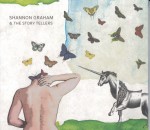 The eponymous Shannon Graham and the Storytellers (shannongraham.ca) (which also features some tracks recorded at the equally renowned Farm Studio)features a local band that often sounds bigger than its parts. Graham, on tenor sax, viola and occasional vocals, is joined by a host of friends on violins, (another) viola, trumpet, trombone, electric guitar, keyboard, bass and drums. I listened to this eclectic disc a number of times before consulting the booklet and was a bit surprised to read about the influences which range from Buddhism, Kurt Vonnegut and Benjamin Britten to everyday occurrences like chasing a runaway dog and taking an overnight bus trip from NYC to Toronto. I’m not sure what I would have expected such a mixed bag to sound like but this self-described classical-jazz-pop band is full of surprises. The stories are mostly told in an instrumental fashion, with occasional vocalise, and only rarely include narrative. The textures range from lush and luscious to sparse and spiky. There are dissonant sections but overall the mood is playful and the sounds a blend of modern jazz and chamber music, occasionally reminiscent of themes from You’re a Good Man Charlie Brown. I mean that in the nicest possible way.
The eponymous Shannon Graham and the Storytellers (shannongraham.ca) (which also features some tracks recorded at the equally renowned Farm Studio)features a local band that often sounds bigger than its parts. Graham, on tenor sax, viola and occasional vocals, is joined by a host of friends on violins, (another) viola, trumpet, trombone, electric guitar, keyboard, bass and drums. I listened to this eclectic disc a number of times before consulting the booklet and was a bit surprised to read about the influences which range from Buddhism, Kurt Vonnegut and Benjamin Britten to everyday occurrences like chasing a runaway dog and taking an overnight bus trip from NYC to Toronto. I’m not sure what I would have expected such a mixed bag to sound like but this self-described classical-jazz-pop band is full of surprises. The stories are mostly told in an instrumental fashion, with occasional vocalise, and only rarely include narrative. The textures range from lush and luscious to sparse and spiky. There are dissonant sections but overall the mood is playful and the sounds a blend of modern jazz and chamber music, occasionally reminiscent of themes from You’re a Good Man Charlie Brown. I mean that in the nicest possible way.
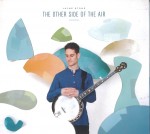 The Other Side of the Air by Canadian banjo player and composer Jayme Stone (jaymestone.com) is, if possible, even more eclectic that Shannon Graham’s disc. The core ensemble backing Stone on seven original compositions consists of familiar names from the local jazz scene: Joe Phillips (bass), Kevin Turcotte (trumpet), Rob Mosher (woodwinds), Andrew Downing (cello and bass) and Nick Fraser (percussion). Stone’s influences range from African tribal sounds to music of Persia and the Far East to mainstream jazz. The most extended work on the disc, lasting roughly half an hour, is This County is My Home, a concerto for banjo and chamber orchestra written for Stone by Andrew Downing, who conducted the premiere in July 2012 at the Home County Music and Arts Festival in London (ON). On the current recording the core ensemble is expanded to include string quartet, more woodwinds and brass played by some of Toronto’s finest classical musicians. The work is in three movements with a brief interlude between the second and third. If anyone doubted the suitability of the banjo for the classical concert stage, Downing’s concerto and Stone’s playing make a convincing case for its inclusion. Stylistically the work is hard to define, but its sensibility is perhaps akin to some of the playful works of Darius Milhaud and others of Les Six without sounding at all anachronistic. (And once again I was reminded at times of Clark Gesner’s score for Charles M. Schultz’ classic!) The final track on the disc, Tennessee Waltz, takes us back to a more traditional context for the banjo although the solos taken by Mosher and Turcotte cast a brand new light on an old chestnut. (And if you don’t think that traditional American country music has had a world wide penetration, I had the wonderful experience of singing and playing my guitar at a reception for the renowned shô player Mayumi Miyata and Japanese composer Toshio Hosokawa several years ago and was amazed and delighted when they both joined in singing Tennessee Waltz!)
The Other Side of the Air by Canadian banjo player and composer Jayme Stone (jaymestone.com) is, if possible, even more eclectic that Shannon Graham’s disc. The core ensemble backing Stone on seven original compositions consists of familiar names from the local jazz scene: Joe Phillips (bass), Kevin Turcotte (trumpet), Rob Mosher (woodwinds), Andrew Downing (cello and bass) and Nick Fraser (percussion). Stone’s influences range from African tribal sounds to music of Persia and the Far East to mainstream jazz. The most extended work on the disc, lasting roughly half an hour, is This County is My Home, a concerto for banjo and chamber orchestra written for Stone by Andrew Downing, who conducted the premiere in July 2012 at the Home County Music and Arts Festival in London (ON). On the current recording the core ensemble is expanded to include string quartet, more woodwinds and brass played by some of Toronto’s finest classical musicians. The work is in three movements with a brief interlude between the second and third. If anyone doubted the suitability of the banjo for the classical concert stage, Downing’s concerto and Stone’s playing make a convincing case for its inclusion. Stylistically the work is hard to define, but its sensibility is perhaps akin to some of the playful works of Darius Milhaud and others of Les Six without sounding at all anachronistic. (And once again I was reminded at times of Clark Gesner’s score for Charles M. Schultz’ classic!) The final track on the disc, Tennessee Waltz, takes us back to a more traditional context for the banjo although the solos taken by Mosher and Turcotte cast a brand new light on an old chestnut. (And if you don’t think that traditional American country music has had a world wide penetration, I had the wonderful experience of singing and playing my guitar at a reception for the renowned shô player Mayumi Miyata and Japanese composer Toshio Hosokawa several years ago and was amazed and delighted when they both joined in singing Tennessee Waltz!)
We welcome your feedback and invite submissions. CDs and comments should be sent to: The WholeNote, 503–720 Bathurst St., Toronto ON, M5S 2R4. We also encourage you to visit our website thewholenote.com where you can find added features including direct links to performers, composers, record labels and additional, expanded and archival reviews.
—David Olds, DISCoveries Editor
discoveries@thewholenote.com


